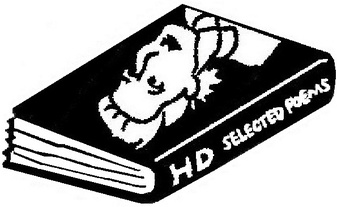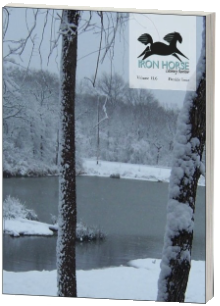Under The Fluff
|
|
|
MY FIRST SEMESTER of grad school wasn't going well. So much reading and writing—I wasn’t prepared. As an undergrad, I’d studied very little and joined as many bar bands as possible; we practiced, shirtless, in the sweltering, year-round heat, sweating buckets in a storage unit somebody’s parents paid for. But those first weeks of grad school, band-less and alone in a new town, the closest I got to rock ‘n’ roll was reading about the F-word (Foucault). It snowed there, too, which was new to me. I bundled up in four shirts and walked to campus begrudgingly, kicking snowdrifts into mini-flurries.
My Tuesday night class examined the poetry of Yeats and H. D. The professor, a poet himself, read their poems aloud beautifully, his voice taking on qualities entirely different from his own. I dug Yeats from the get-go. He was young, passionate, pissed off about politics. “Lots of angst here,” the prof said, pronouncing angst the German way. Yeats was The Clash, or U2, back when they were angry. But H. D. bored me. Her nature poems described plant life and seemingly nothing more. She was Enya, unexciting, sedate as Muzak. One poem fixated on a sea rose “caught in the drift. / Stunted, with small leaf.” I didn’t get it. “Ooh, her voice is delightful,” said a young woman seated next to me, a seasoned PhD student. “And the music of the lines is just…” She trailed off in ecstasy. From this, I assumed she owned fifteen cats.
Our prof agreed with her, demanded we listen for such music in our reading. Then he turned to me: “Tell me, how does H. D. compare to Yeats?” “Um, she . . .” I’d never talked about poems before. “I think her work is…” I fiddled with my copy of H.D.’s Selected Poems in my lap. Her photo was on the cover: an elderly woman, blouse and sweater buttoned tight at her throat, silver hair swept back from her face. She stared me down. Finally, I said, “It’s fluffy.” There were gasps. I gasped, too, relieved to have said anything at all. Then I watched every face in the room grimace. I didn’t know that when you use it to refer to art, fluffy means “trivial,” “superficial.” Fluffy is what you call tawdry romance novels sold at gas stations. I’d meant to say that H.D. seemed pleasant compared to angsty Yeats—harmless as the snow I’d tracked into the classroom on my boots. “Yes,” the prof said. “I can see how H. D. might come off that way, to inexperienced ears.” • IT DIDN'T STOP THERE. My critical theory professor said my papers showed no indication I’d been taking her class at all. In my fiction workshop, I was turning in half-stories, sketches of characters so indecisive they hardly spoke or did anything on the page—lives caught in the drift, stunted.
That winter was the whitest in years. Layer upon layer of snowfall piled onto my leaky roof. The ceiling tiles swelled, pregnant with snowmelt, threatening to leak all over the guitars and amplifiers I’d brought with me in the move. I wanted so badly to go back to what I knew, and if I couldn’t be in a band again, I’d be a band by myself—on tape. I turned my place into a makeshift recording studio. The setup was lo-fi: microphones plugged into a laptop, amps and drums in the kitchen, guitars leaned against the coffee table. Home recording was new to me, so I started with songs I knew by heart, music I’d heard since childhood: early Beatles, Motown, a couple of old country tunes. I listened closely to those records, striving to mimic the original mixes, adjusting microphones around my drum set, tweaking my guitars to sound like Lennon’s and Harrison’s. I’d record a guitar part and pretend the music in my headphones—the tracks I’d laid down only minutes earlier—had come from other musicians, imaginary bandmates I was recording alongside. We played nonstop. I missed meals. I reminded myself to attend class. But then I had to sing. I don’t know which I dreaded more: recording vocals, or writing my final paper on Yeats and H.D. In my college bands, I never cared about what the singer did. I focused on the music, the poetry beneath the pretty voice. (“People dance to drums and bass, man, not the singer!”) With no clue what my own voice sounded like, I imitated the songs’ original vocalists: for the Beatles tracks, I sang a slight British accent; for the country tunes, I turned up the twang. I was like my poetry prof, who changed his voice depending on which poet’s work he was reading—except he understood how a strong, well-executed voice, such as H.D.’s, works to showcase the music beneath it.
I listen to those recordings often, and five years later, I still stand by the music—it’s hit after hit, no fluff—but I want no one else to hear them. My vocals sound like karaoke tributes rather than expert interpretations. If only I’d understood the voice-music relationship sooner, but for me, things tend to come slowly, in a gradual thaw. I bumbled my way through the final Yeats and H.D paper, and as I typed, three rotating space heaters pivoted toward me in a whirring crescendo. Water from my leaky ceiling dribbled rhythmically into kitchen pots I’d placed on the floor. Behind me, guitars and amps lay protected beneath plastic drop cloths, quiet as snow.
|
THIS COLUMN ORIGINALLY APPEARED IN IRON HORSE LITERARY REVIEW VOL 13.6 |




